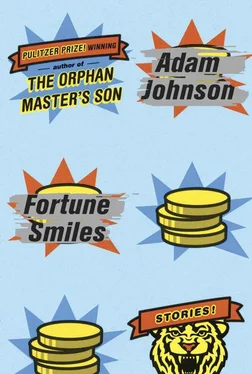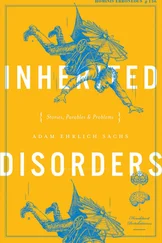—
One afternoon, I wander deep into Golden Gate Park, beyond the pot dealers on Hippie Hill and the rust-colored conning tower of the de Young Museum. I pass even the buffalo pens. In the wide meadows near the Pacific Ocean, I discover, by chance, my husband and children at the archery range. What are they doing here? How long have they been coming? They have bows drawn and, without speaking, are solemnly shooting arrows, one after another, downrange into heavy bales. The Horse-child draws a recurve, while my daughter shoots Olympic and my son pulls a longbow with his lean and beautiful arms. My husband strains behind a compound, its pulleys and cams creaking under the weight. He has purchased hundreds of arrows, so they rarely pause to retrieve. When the sunset fog rolls in, they fire on faith into a blanket of white. When darkness falls, they place balloons on the targets so they can hear the pop of a well-placed arrow. I have acquired a keen sense of dark trajectory. I stand beside my husband, the power of a full draw bound in his shoulders. I whisper release when his aim is perfect. He obeys. I don’t need to walk through the dark with him to see the arrows stacked up yellow in the bull’s-eye.
Later, he doesn’t read books to the children before bed. Instead, on our California king, they gather to hear him repeat a story he has heard podcast by Lakota Sioux storytellers. My husband never speaks of his Sioux blood. He has never even visited the reservation. All the people who would have connected him to that place were long ago taken by liquor, accidents, time-released mayhem and self-imposed exile.
The story he tells is of a ghost horse that was prized by braves riding into battle because the pony, already being dead, could not be shot from under them. This pony, afraid of nothing, reared high and counted its own coup. Only at the end of the clashes do the braves realize a ghost warrior had been riding bareback with them, guiding the horse’s every move. In this way the braves learn the gallop of death without having to leave this life.
The Horse-child asks, “Why didn’t the ghost horse just go to heaven?”
I realize it’s the first time I’ve heard the Horse-child speak in — how long?
My daughter answers her. “The story’s really about the ghost warrior.”
The Horse-child asks, “Why doesn’t the ghost warrior go to heaven, then?”
My daughter says, “Because ghosts have unfinished business. Everybody knows that.”
My son asks, “Did Mom leave unfinished business?”
My husband tells them, “A mom’s work is never done.”
A health issue can be hard on a family. And it breaks my heart to hear them talk like I no longer exist. If I’m so dead, where’s my grave, why isn’t there an urn full of ashes on the mantel? No, this is just a sign that I’ve drifted too far from my family, that I need to pull my act together. If I want them to stop treating me like a ghost, I need to stop acting like one.
Interesting fact: In the TV movies, a ghost mom’s job is to help her husband find a suitable replacement. It’s an ancient trope — see Herodotus, Euripides and Virgil. For recent examples, consult CBS’s A Gifted Man, NBC’s Awake, and Safe Haven, now in heavy rotation on TCM. The TV ghost mom can see through the gold diggers and wicked stepmoms to find that heart-of-gold gal who can help those kiddos heal, who will clap at the piano recitals, provide much-needed cupcake pick-me-ups and say things like “Your mom would be proud.”
I assure you that no such confectionary female exists. No new wife cares about the old wife’s kids. They’re just an unavoidable complication to the new wife’s own family-to-be. That’s what vasectomy reversals and Swiss boarding schools are for. If I were a ghost mom, my job would be to stab these rivals in the eyes, to dagger them all. Dagger, dagger, dagger.
—
The truth is, though, that you don’t need to die to know what it’s like to be a ghost. On the day my doctor called and gave me the diagnosis, we were at a party in New York. Our mission was to meet a young producer for The Daily Show who was considering a segment on my husband. She was tall and willowy in a too-tight black dress, and while her breasts may once have been perfect, she had dieted them down to nothing. Right away she greeted my husband with euro kisses, laughed at nothing, then showed him her throat. I was standing right there! Talk about invisible. Then my phone rang — Kaiser Permanente with the biopsy results. I tried to talk, but words didn’t come out. I walked through things. I found myself in a bathroom, washing my face. Then I was twenty floors below, on Fifty-seventh Street. I swear I didn’t take the elevator. I just appeared. Then I was on a bus in North Carolina, letting a hard-drinking preacher massage my shoulders while my friend was dying in Florida. Then it was my turn. I saw my own memorial: My parents’ lawn is covered with cars. They must buy a freezer to store all the HoneyBaked hams that arrive. My family and friends gather next to the river that slowly makes its way past my parents’ home. Here, people take turns telling stories.
My great-uncle tells a story about me as a little girl and my decision to wed the boy next door. My folks got a cake and flowers and had the judge down the street preside in robes over the ceremony. The whole neighborhood turned up, and everyone got a kick out of it. The next day brought the sobering moment when my folks had to tell me the marriage wasn’t real.
My brother tells a story about my first Christmas home from college and how I brought a stack of canvases to show everyone the nudes I’d been letting the art-major boys paint of me.
My mother tries to tell a story. I can tell it will be the one about the Christmas poodle. But she is overcome. It scares the children, the way she slow-motion folds up, dropping to the ground like a garment bag. To distract them, my father decides on a canoe ride — that always was a treat for the kids. Tears run from their eyes as they don orange vests and shove off. Right away, the Horse-child screams that she is afraid of the water. She strikes notes of terror we didn’t know existed. My son, in the bow, tries to hide his clutched breathing, and then I see the shuddering shoulders of my daughter. She swivels her head, looking everywhere, desperately, and I know she is looking for me. My father, stunned and bereft, is too inconsolable to lift the paddle. My father who performed more than fifteen hundred field surgeries near Da Nang, my father who didn’t flinch when the power went out at Charity Hospital in New Orleans, my father — he slowly closes his pearl-grey eyes. They float there, not twenty feet from us, the boat too unsteady for them to comfort one another, and we onshore can only wrench at the impossibility of reaching them.
Back inside the New York party, I realized time had ceased to flow: my husband and the producer were laughing the exact same laugh, the lime zest of their breath still acrid in the air, and I saw this was in the future, too, all these chilly women with their iron-filing eyes and rice-paper hearts. They wanted something genuine, something real. They wanted what I had: a man who was willing to go off the cliff with you. They would come after him when he was weak, I suddenly understood, when I was no longer there to fend them off. This wasn’t hysteria. It wasn’t imagination. I was in the room with one of them. Here she was, perfect teeth forming a brittle smile, hips hollow as sake boxes.
“That story is too funny,” the producer said. “Stop it right there. Save it for the segment!”
In a shrug of false modesty, my husband accidentally sloshed his soda water.
“Well,” he said. “Only if you think it would be good for the show.”
Читать дальше












